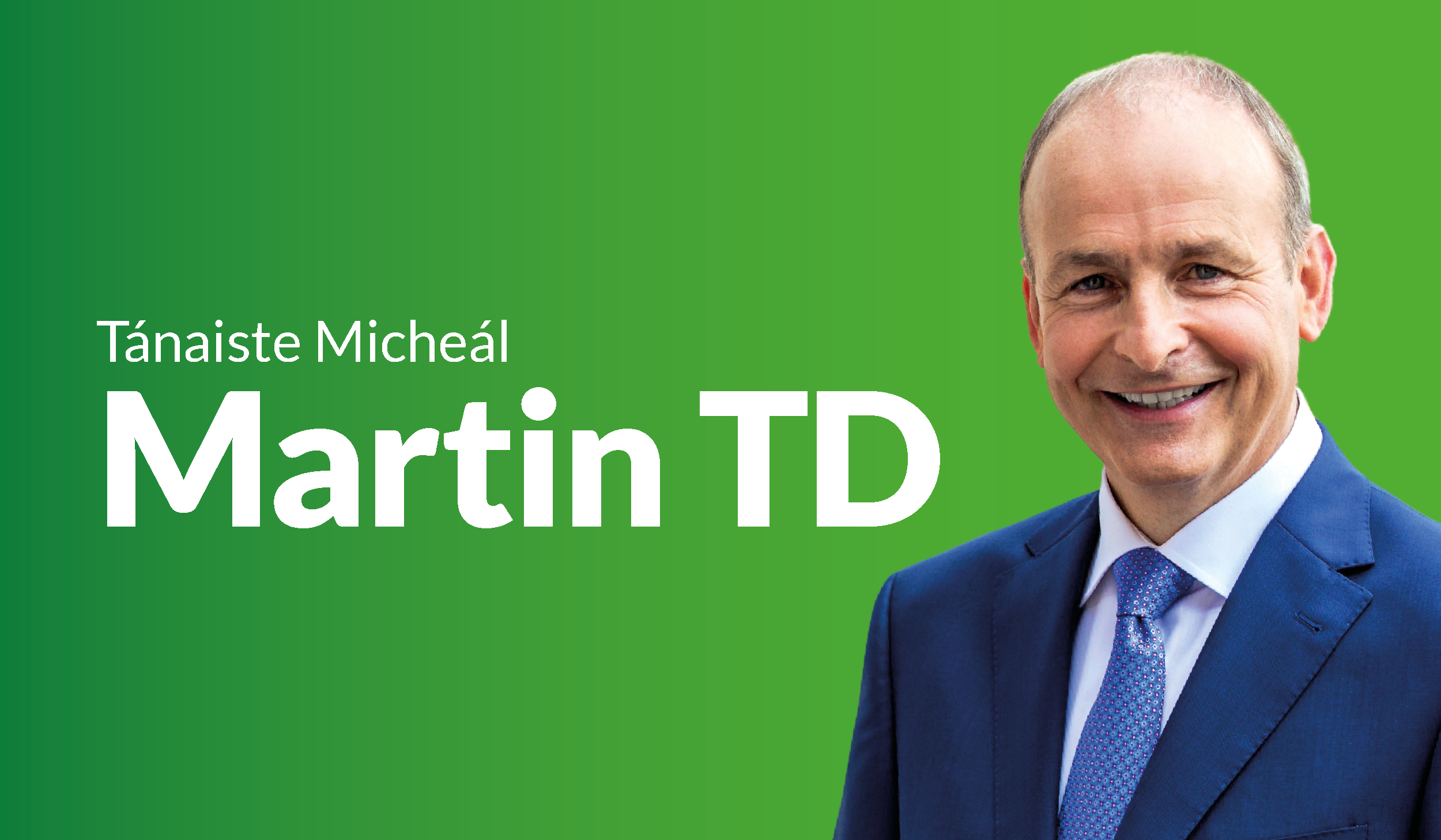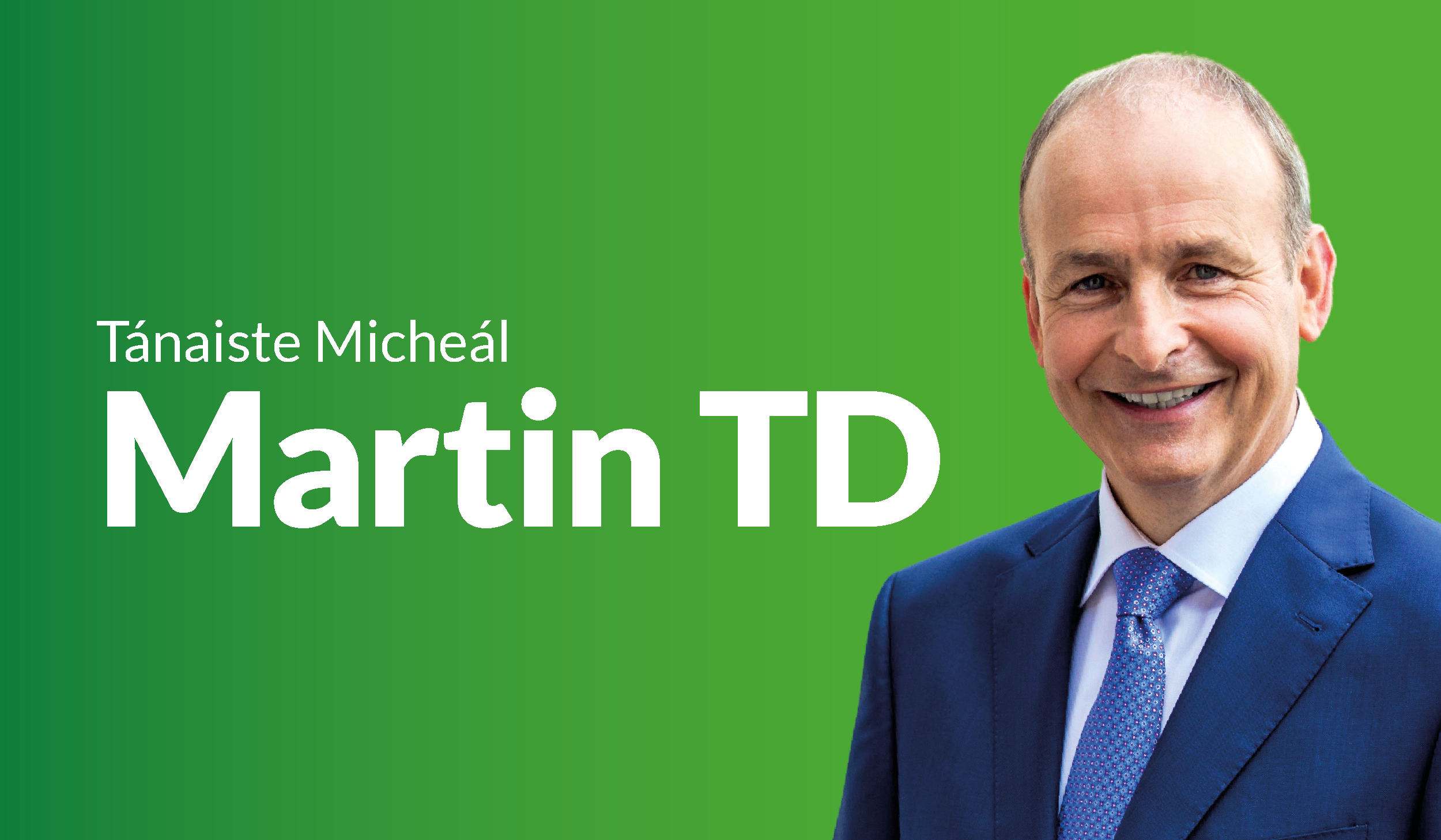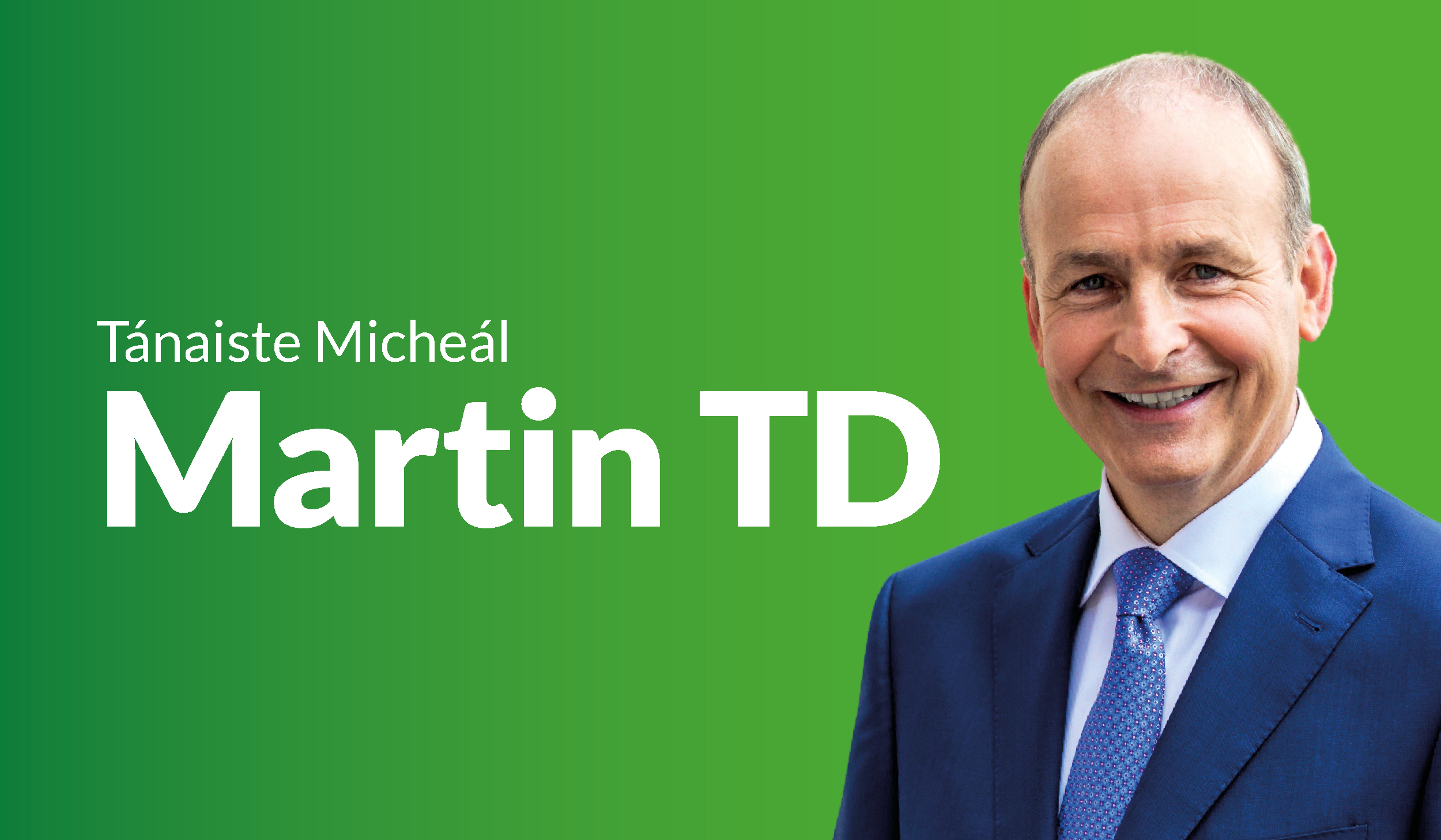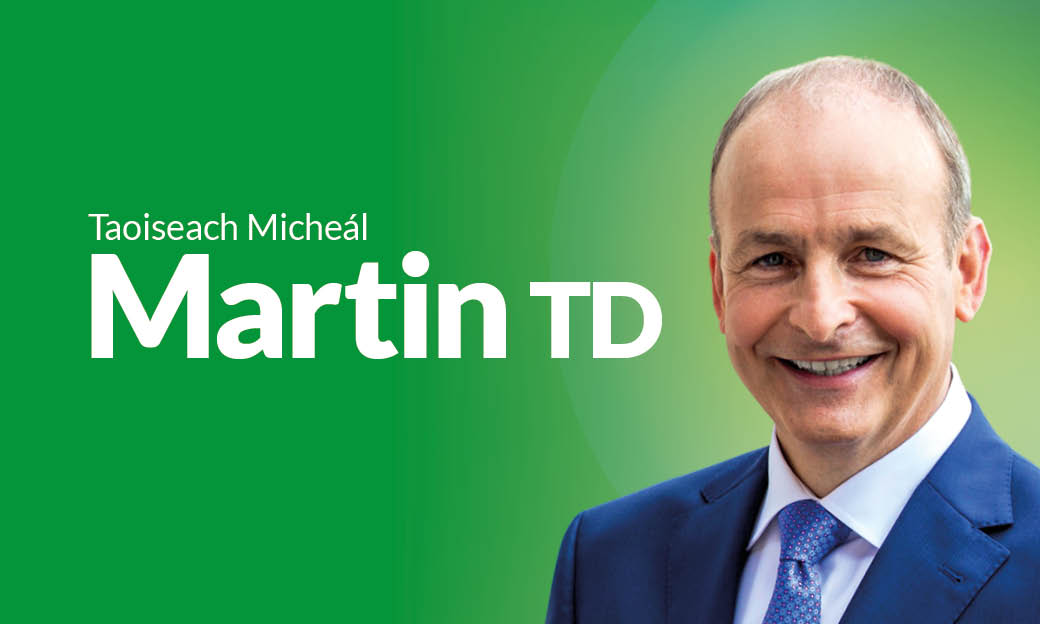Speech of An Taoiseach, Micheál Martin TD, Fianna Fáil 1916 Commemoration Arbour Hill, 10th April 2022
Published on: 10 April 2022
Nuair a thagaimid go dtí an áit seo inniu, táimid anseo chun ómós a thabhairt do thírghráthóirí den chéad scoth, chun a gcuid íobairtí a thabhairt chun cuimhne agus chun an traidisiún a raibh siad chomh bródúil ag seasamh ar a shon a athbheochan.
Rinne na laochra atá curtha anseo íobairtí ar son a dtíre agus don fhís den phoblachtachas a d'fhreagair riachtanais na ndaoine.
Ní raibh cosúlacht dá laghad idir iad agus na hidé - éolaithe cúngaigeanta.
Do na laochra seo, bhí baint ag ár dteanga agus ag ár gcultúr le smaoineamh siar ar an ré a bhí thart agus ár dtodhchaí a mhúnlú chomh maith.
Theastaigh Éire uathu a sheas an fód le tíortha eile agus ní i gcoinne thíortha eile ná iargúlta scartha amach ar imeall na hEorpa.
Bhí clár oibre dearfach ag na laochra úd cinnte, bhíodar oscailte do thraidisiúin eile agus fréamhaithe i ndúshláin an lae inniu.
When the patriots buried in this place were executed they had no idea what would follow. Yes they hoped that they would inspire the Irish people to claim their independence, but they could not have imagined just how much would be achieved within a few short years.
Theirs’ was ultimately an act of faith – faith in the ability of Irish republicanism to inspire and renew.
The Proclamation which they published remains a testament to their positive, inclusive and outward-looking vision for Ireland.
At a time of rising nationalism throughout the world, they rejected the approach of defining your own identity as a single tradition standing against others.
Inspired by the European liberal tradition of 1789 and 1848, they wanted an Ireland which stood shoulder to shoulder with other nations in a spirit of shared values and respect.
The Proclamation is almost unique internationally in the fact that it demands that those who promote the new republic must vindicate the rights of others – disowning those whose behaviour dishonours the Republic.
We should always be proud of this and the fact that our revolution began with a commitment to build a country which would equally respect different traditions, extend rights to women and respect democratic values.
Today we have one of the most enduring democracies in the world. We have many profound challenges, but our country’s prosperity and its place in the world have been transformed.
Our party first came to this hallowed place soon after our foundation. The two most important surviving leaders from the Rising, Eamon de Valera and Constance Markievicz, were present and were accompanied by many who had served their country in 1916 and the years afterwards.
1916 belongs to no party, but we have every right to be proud of the central role which the men and women of 1916 played in founding and leading Fianna Fáil.
And with this pride comes an obligation. An obligation to honour their vision of a republicanism which is a living tradition – one which creates new opportunities and responds to the challenges of new generations.
It is because they achieved so much for us that we have been able to find new ways forward. It is because of their open and generous nationalism that we have been able to avoid the extremism which was such a destructive force in much of the world during the last century.
The spirit of the founders of our country is also central to the sense of solidarity which Irish people feel towards others who are trying to secure their freedoms and to face down the forces of imperialism.
The inhumane war of the Putin regime against Ukraine represents an attempt to assert the right of a powerful country to dominate its neighbours and to crush basic democratic rights. It is part of an ongoing attempt to roll-back the great advances achieved in the last thirty years and to undermine cooperation between free democracies.
Ireland stands with Ukraine and its determination to not just survive this brutal onslaught but also to be prosperous and secure as part of the European community of nations.
When you look at the arguments being used by Russia today it should scare any country in the world which has struggled to achieve independence. According to Russia, large and powerful countries should have a right to directly control any area they controlled in the days when empires ruled the globe.
We do not belong to a military alliance, but we are not neutral in the face of this aggression. Anyone who indulges in talking about ‘both sides’ is failing the basic moral challenge of calling out clear evil.
Ukraine’s struggle is our struggle. That is why we will continue to host people fleeing the conflict. We will continue to support their freely elected President and government. We will never accept the idea that Russia has a right to control any part of Ukraine.
There can be no more frozen conflicts – where brute force imposes partitions on countries and is used to destabilize regions.
And we also understand that the urgency of working with our European and international partners to protect our democracies from attempts to undermine them.
As a country we have to stop indulging the corrosive anti-EU sentiment of far too many in our politics.
For far too long we have ignored the real differences between parties on where they stand on Ireland’s place in the world.
This year we mark 50 years of our membership of the European Union – a membership which has directly enabled prosperity and peace on this island.
Every poll shows that this is understood by the Irish people and there is overwhelming support for the idea that Ireland should both be a member and be a positive member.
Yet one third of Ireland’s MEPs are reliable votes for attacking the EU and defending its opponents. The recent shameful diatribes blaming the EU for Putin’s aggression are not new. Look back on the record and you will see one party and a range of other self-described radicals attacking everything the EU does. Sometimes they claim that they are just calling for reform, but the bottom line is that they have constantly misrepresented and distorted the European Union and attacked our partners.
With the exception of a handful of courageous journalists, they have not been held to account and have got away with their constant “what about” claims where Europe is to blame for everything.
In contrast, ours is a proudly pro-EU party. It was the final political act of our revolutionary founders to set our country on a European course.
To us, democratic values cannot be taken for granted, they must be protected. We will do whatever it takes to work with other countries to defend these values.
We will continue to focus on urgent humanitarian aid to Ukraine, but we have to be clear that we need a proper, informed and inclusive debate about our future policies. The world has changed and Ireland must respond. We cannot sit still and simply hope that we are left alone.
There can be no question as to where Ireland stands and there can be no question about the fact that we understand that we are affected by international events. We cannot pretend to live in isolation or to allow the false idea that all sides of conflicts are the same.
In the sea and air around our island we have seen actions taken which have no innocent explanation. Óglaigh na hÉireann must have the capacity and the authority to carry out essential functions to protect our freedoms and those who share our values. And they must also have the ability to build on their unique record in peacekeeping throughout the world.
Our commitment to working with our European partners has to be reinforced. Coordination and shared activities with other defence forces over the last twenty years has proven that this activity is a benefit to us and aids European security. We have to look for ways to build on this.
A strong and successful European Union means a strong and successful Ireland. That is why, over the past two years, as Taoiseach I have made it clear at European summits and in meetings with other EU leaders, that Ireland is not standing on the sidelines. We are actively supporting measures to improve the work of the EU and its ability to respond to new and urgent economic, environmental and political challenges.
We are a proud republican party and, as we have always done, we believe that the way to unleash the full potential of everyone on this island is for us to be together.
Where we differ from others, is that we believe that the only way to build this future is for us all to work together to fight sectarianism, to build bridges between communities and to secure a prosperity for all.
We need a politics which serves all of the people – not just your own. A politics which is concerned about all injustices – not just those against your own. And most of all, we need a politics which is genuinely willing to change and evolve.
The Good Friday Agreement is a brilliant blueprint for building a new future because it has as its foundation a democratic and inclusive vision for this island.
Unfortunately, far too often this spirit of the Agreement has been ignored. The opportunity to focus on sectarianism and disadvantage has been missed.
And in Dublin, both in politics and in the media, Northern Ireland was often ignored as an issue until there was a crisis at hand. Even worse, we’ve had completely different strategies shown by some in Belfast to their strategies in Dublin.
Our party is proud of its central role in securing the Agreement and we are determined that its spirit will be honoured. The first step in this is undertaking the type of essential work without which you cannot build understanding and cooperation.
The Shared Island Initiative is the first time that there is a systematic approach to trying to detail what we share, where we differ and where we can benefit from working together. It’s the first time that there has ever been a systematic approach to building connections – both physically and networks of interest.
How can we have an honest debate about our future if we don’t set out the full details of where we are today and the challenges we will face in the future?
It’s not about endlessly reciting the old lines – it’s about actually doing something.
And it is because we recognise the scale of the challenges facing our country that in this government we have taken responsibility for critical issues.
Our biggest focus has of course been on getting Ireland through a once-in-a-century public health emergency. I believe that any fair assessment will see that Ireland has succeeded in limiting the terrible impact of the virus and that we have been one of the best in the world at quickly utilising the transformative potential of vaccines.
However, in spite of the enormous constraints imposed by the pandemic, we have also worked hard to begin implementing a range of vital actions on issues which faced our country before anyone had heard of Covid-19.
We confronted the fastest and deepest recession recorded in over 80 years and, working with our partners in government, responded equally quickly to save as many jobs as possible, protect public services and ensure the fastest recovery in Europe.
We have put in place the funding and the policies to begin a new era of social and affordable housing. While other parties concentrate on objecting to thousands of new homes, we are focusing on building the capacity of the system and the investment required to ensure ongoing delivery.
While tackling the urgent pandemic response, we’ve put in place concrete plans to address underlying problems in the health system. Investments are underway to improve the quality and accessibility of services. Amongst the most important of these is a step-change in our approach to providing badly needed mental health services throughout the country.
Education is today, as it has been since our foundation, a fundamental priority for Fianna Fáil. Every major expansion in education provision has been initiated by our ministers. In this government we have already delivered a significant increase in resources for education and we are now going further. We are moving ahead with the first broad reform of the leaving certificate in fifty years. The leaving certificate has served our country well in the past – but it has serious weaknesses which simply have to be addressed.
And this government will be recognised for making rapid and vital progress in addressing the existential issue of climate change. The profound economic, social, political and environmental damage of climate change is so great that it is a defining issue of our times and requires a response which can deliver a real transformation.
As we’ve seen in recent weeks, reliance on sources of oil and gas has exposed how vulnerable we already. Moving to sustainable energy isn’t an option for us if we want to protect our values, our communities and our shared future.
The pressures on the basic costs of living at the moment are being felt everywhere. Because so many of the causes of this are outside our control, there are limits to what can be done – but everything which can reasonably be done will be done to make sure that the weakest in our society are helped as we get through this incredibly difficult period.
I’m proud of what our government is achieving in difficult times and the fact that we are focused on putting our country’s interests ahead of party politics.
I’m proud of our party’s members who are focused on trying to lead real change in vital areas.
I’m proud of the incredibly constructive approach of our organisation and the support which it provides every day as we work to serve the people of our country.
There are no longer veterans amongst us to share their personal stories, but the republicanism of the men and women of 1916 remains an inspiration for us.
There’s was a republicanism which demonstrated respect for all traditions.
A generous republicanism, which had no time for sectarianism.
A republicanism committed to an outward-looking Ireland.
A republicanism which respected the past but looked to the future.
Today we honour their sacrifices for us and we renew our commitment to the great ideals which they represented.



